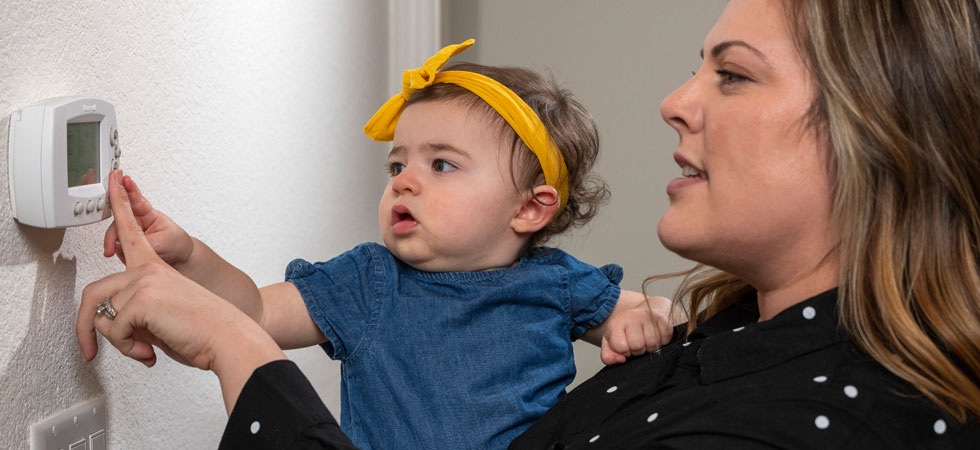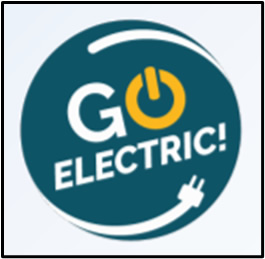Beneficial Electrification
Beneficial electrification is electricity use that would otherwise be powered by fossil fuels (natural gas, diesel, propane, fuel oil or gasoline) where doing so has a benefit to consumers or the environment.
Four Pillars of Beneficial Electrification:
To be considered beneficial, a product or service must meet one of the four pillars below without harming the other three.
1. Saves money for electricity consumers and providers.
2. Reduces environmental impacts.
3. Creates greater grid flexibility and resiliency.
4. Improves quality of life for member-consumers and their communities.
Keep in mind that, while promoting the benefits of electrification, we are not suggesting electrifying everything. Some of the best opportunities for beneficial electrification can involve systems that use more than one fuel source. For example, Hybrid Heat Pump Systems can be used to heat with electricity on mild winter days and natural gas or propane to provide heat on the coldest winter days. Hybrid Heat Pumps can offer consumers the best of both worlds scenario, flexibility on heating fuel sources and higher overall system efficiency.
Other examples of beneficial electrification that are growing in popularity include electric vehicles, electric mowers, electric snowblowers, electric bicycles and heat pump water heaters.
Linn County REC will continue to promote energy efficiency along with beneficial electrification to help our members, communities, and the environment.
What is Beneficial Electrification (Video)
Upgrade your home heating and cooling and save! Get cash back on your new equipment when you take advantage of rebates.
- Ground-Source Heat Pump rebate
- Air-Source Heat Pump rebate
- Heat Pump Electric Water Heating rebate
- Heat Pump Clothes Dryer rebate
Learn more about air-source & ground-source heat pumps.
An electric heat pump is the most energy-efficient home heating and cooling option available today – providing heating equal to three times the amount of electricity consumed. Switching from a traditional gas-fueled furnace to an electric heat pump system can significantly improve your home’s energy efficiency, reduce your energy consumption and help you save money on your utilities.
An electric heat pump serves a dual purpose – replacing your furnace and air conditioner by functioning as your home’s primary heating and cooling system. There are two types to consider:
- Air-source heat pumps work by transferring heat between the inside of your house and the outside air. Whether you’re upgrading to something more efficient or replacing a worn-out furnace or air conditioner, you’ll find that air source heat pumps are an economical choice that provide year-round savings.
- Ground-source heat pumps take advantage of the earth’s constant temperature by circulating a water-based solution through pipes buried in the ground. This method of heating and cooling your home is environmentally friendly, reliable, quiet, comfortable, cost effective and the most energy efficient available.
Enjoy the benefits of going electric.
The cost to heat your home represents nearly half of your home’s total energy consumption. Upgrade from your gas furnace to an electric heat pump and you’ll improve your energy efficiency – and enjoy a variety of other benefits as well.
- Stay comfortable all year long: Enjoy stable, reliable heating and cooling year-round – saving energy while leaving the thermostat set right where your family likes it.
- Heat your home safely: Eliminate carbon monoxide risk and rest easy knowing your heat pump produces no harmful emissions.
- Save money: Reduce your utility bill by lowering the amount of electricity you use to heat your home by up to 40 percent – and qualify for immediate rebates on qualifying equipment.
Consider a Heat Pump water heater.
In most homes, the cost of water heating is second only to the overall heating and cooling expense. Replace your inefficient unit with an efficient Heat Pump water heater to save money on your home’s utility bill. In fact, they can be 2 to 3 times more energy efficient than conventional water heaters.
Consider a Heat Pump clothes dryer.
For even more savings, consider ENERGY STAR certified heat pump dryers - they can save 20-60 percent more than conventional clothes dryers. All heat pump dryers meet the criteria for ENERGY STAR Most Efficient.
A heat pump dryer works as a closed loop system by heating the air and using it to remove moisture from the clothes, then reusing it once the moisture is removed. Rather than releasing moist air through a dryer vent to the exterior of the home as a conventional dryer does, a heat pump dryer passes humid air in the dryer drum through a condenser to remove the moisture without losing too much heat. The condensed moisture (water) from the drum is drained or emptied out of a holding tank in the dryer.

